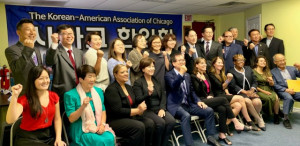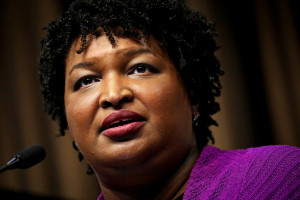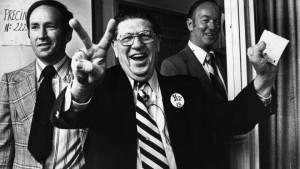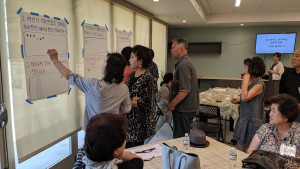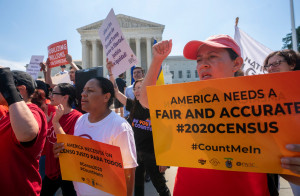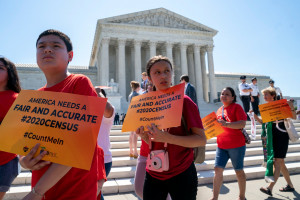Californians will be able to register to vote on election day at local polling places and voting centers under legislation signed by Gov. Gavin Newsom on Tuesday, a potentially significant step toward boosting turnout in key contests next year. The new law provides for a significant expansion of so-called conditional voter registration, which allows a new voter to cast a ballot that is counted after eligibility is determined during the 30-day vote-counting period after an election. That process began in last year’s statewide election, but registration was available only in county elections offices. Starting next year, voters can register on election day anywhere ballots are cast.
Civic Engagement
The people convincing immigrants to take the 2020 census
PUBLISHED ON OCTOBER 1, 2019OCTOBER 2, 2019
BY SARAH CONWAY, IRENE ROMULO, ALEXIS KWAN, MORGAN LEE, AYANA COCHRAN AND CITY BUREAU
Korean Americans are the latest immigrant group in the Chicago area to establish a complete count committee to boost participation in next year’s census. Inhe Choi, executive director of the HANA Center, one of the groups leading the census outreach, said Korean Americans face many of the same challenges as other immigrant communities in the Chicago area.
Women of color, especially black women, are potent forces in progressive politics, both in office and as organizers who mobilize voters. It seems that liberals take this for granted, but conservatives tacitly recognize the political power of women of color when they try to discredit them through ridicule and harassment. A new report called “Ahead of the Majority,” by the AAPI Civic Engagement Fund and Groundswell Fund uses recently released census data, polling data from the 2018 midterm elections and interviews with community organizers to illuminate the political power of women of color. Their numbers are growing, and they are turning out to vote; mobilizing their families, friends and communities; and taking to the streets.
No brand in California politics has ever had the staying power of Proposition 13, the 1978 tax cut that served as a primal scream from angry voters and became a symbol of their reluctance to pay more money for more government services. But four decades later, it is critics of the landmark ballot measure who are angry. Their demand to downsize Proposition 13 by excluding most commercial property from the law’s strict tax limits is all but certain to win a spot on the November 2020 ballot, an epic campaign clash that could alter California’s political landscape for years to come.
KRC organizes a group of Korean American seniors (previously known as Community Health Promoters) who meet monthly to learn about community issues, take action, and bring change to the community. In August, we will learn about how KRC operates financially and our long-standing tradition of community-powered fundraising.
Join us at "Communities for Education," a social event on Saturday, August 10, 12pm at KRC's Crenshaw Office for everyone to learn more about the American education system and its relationship with different communities. Following our presentations on the theme topic, guests will have the opportunity to discuss with a panel of educational figures, activists, and students. Our social will also include free food, games, karaoke, a photo booth, and a raffle giveaway. Spend your summer right by engaging with the community and creating dialogues about the education system.
A day after pledging that the 2020 census would not ask respondents about their citizenship, Justice Department officials reversed course on Wednesday and said they were hunting for a way to restore the question on orders from President Trump.
The Trump administration said Tuesday that it would be printing forms for the 2020 census without a question asking about citizenship, abandoning its quest to add the query after being blocked last week by the Supreme Court. The decision is a victory for critics who said the question was part of an administration effort to skew the census results in favor of Republicans.
Today, the Supreme Court delayed its decision on whether to add a “citizenship question” to the 2020 Census citing legally inadequate explanations from the lower courts. The decision on whether to add the citizenship question now remains up in the air as the Supreme Court is now waiting for a fuller explanation from the lower courts before moving forward. NAKASEC & Affiliates will be following the Citizenship Question closely and will alert our community of any new developments. Furthermore, we urge AAPIs, immigrants, and communities of color to participate as best as they can in the 2020 Census. We remain committed to our fight for full citizenship for all and an inclusive democracy.



